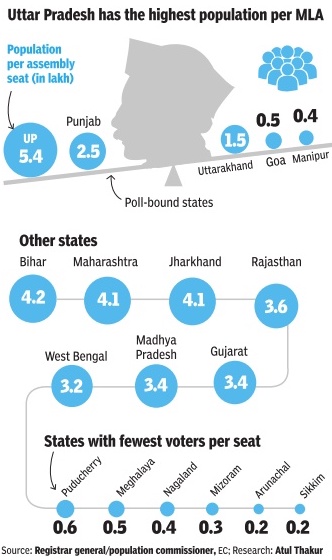Members of Legislative Assemblies (MLAs): India
This is a collection of articles archived for the excellence of their content. |
Contents |
Allowances
International travel
Rajasthan/ 2020
Joychen Joseph, August 25, 2020: The Times of India
In the first instance of a state tweaking the perks of legislators amid the pandemic, the Rajasthan assembly on Monday passed an amendment that allows MLAs to bill the exchequer for even foreign trips so that their annual travel expenditure entitlement of Rs 3 lakh is fully utilised.
While MLAs of several states enjoy paid foreign travel categorised as “study trips”, Rajasthan so far did not have any provision for reimbursement of travel expenses other than for domestic official tours. Travel coupons for domestic travel could be used for up to a maximum of 15 days a month.
“The Rajasthan Legislative Assembly (Officers and Members Emoluments and Pension) (Amendment) Act, 2020, also provides for reimbursement of the travel expenses of former MLAs up to a maximum of Rs 1 lakh annually,” assembly’s deputy chief whip Mahendra Chaudhary told TOI. If the amount reimbursed in a financial year is less than the hiked ceiling of Rs 3 lakh, the rest of the entitlement can be carried forward. A member entitled to receive travelling allowance under section 8 of the law can choose to travel by air, rail, ship or steamer, the law states.
Population-MLA ratio, state-wise

See graphic
Population per assembly seat, state-wise
Suspension of MLAs
Can’t suspend MLAs for over 6 months: SC
Amit Anand Choudhary, January 19, 2022: The Times of India
NEW DELHI: Observing that a legislative body does not have “untrammelled power” to suspend its members for an indefinite period, the Supreme Court on Tuesday questioned the Maharashtra assembly’s decision to suspend 12 BJP legislators for one year, observing that it was “against democracy” and could be misused by any ruling party having a thin majority, reports Amit Anand Choudhary.
A bench of Justices AM Khanwilkar, Dinesh Maheshwari and C T Ravikumar expressed disapproval over suspension of members for more than six months and observed that anything beyond it would be “irrational and unconstitutional”. It said a constituency cannot go unrepresented beyond six months as per constitutional provisions. It said that the Election Commission can conduct fresh elections in case of expulsion, but the Commission would have no role to play if members are suspended.
“It can be very dangerous to democracy also. In cases where the government has a very slender lead and if few members are suspended for a long time then what would be the fallout... The assembly cannot provide any additional ground for disqualification for members which is not provided in law,” the bench said.
The bench said if a member of assembly is suspended, it is done for the purpose of carrying business of the House smoothly for a session and the period of suspension should be for the session.
“There should be some purpose of suspension and the purpose is with regard to a session. It should not travel beyond one session. And anything other than this would be irrational. The real issue is about the rationality of the decision. The decision of one year seems irrational. If the suspension is done beyond a session, it has to be examined also from rationality point of view,” the bench said. The court expressed apprehension that if the decision of the Maharashtra assembly is upheld, similar situations may arise in other states also and it would have “wider ramification for democracy”.
“Legislature does not have untrammelled power and the constitutional court is supreme in this regard,” the bench said after the state government contended that the court has a limited role while examining the validity of the decisions taken by the assembly.
“You have power to expel members but it does not mean that you can suspend them for an indefinite period. Suspension is done to enable the House to complete the business in one session and the suspension has to be considered in that context,” the bench said. The court had earlier said that suspension of 12 BJP MLAs in Maharashtra for one year is worse than expulsion.
It had referred to Article 190 (4) of the Constitution which says that if for a period of 60 days, a member of a House, without its permission, is absent from all meetings, the House may declare his or her seat vacant.
On December 14, the SC had sought responses from the Maharashtra assembly and the state government on the pleas filed by the 12 BJP MLAs challenging the resolution passed by the House to suspend them for one year.
The 12 suspended members are Sanjay Kute, Ashish Shelar, Abhimanyu Pawar, Girish Mahajan, Atul Bhatkhalkar, Parag Alavani, Harish Pimpale, Yogesh Sagar, Jay Kumar Rawat, Narayan Kuche, Ram Satpute and Bunty Bhangdia.